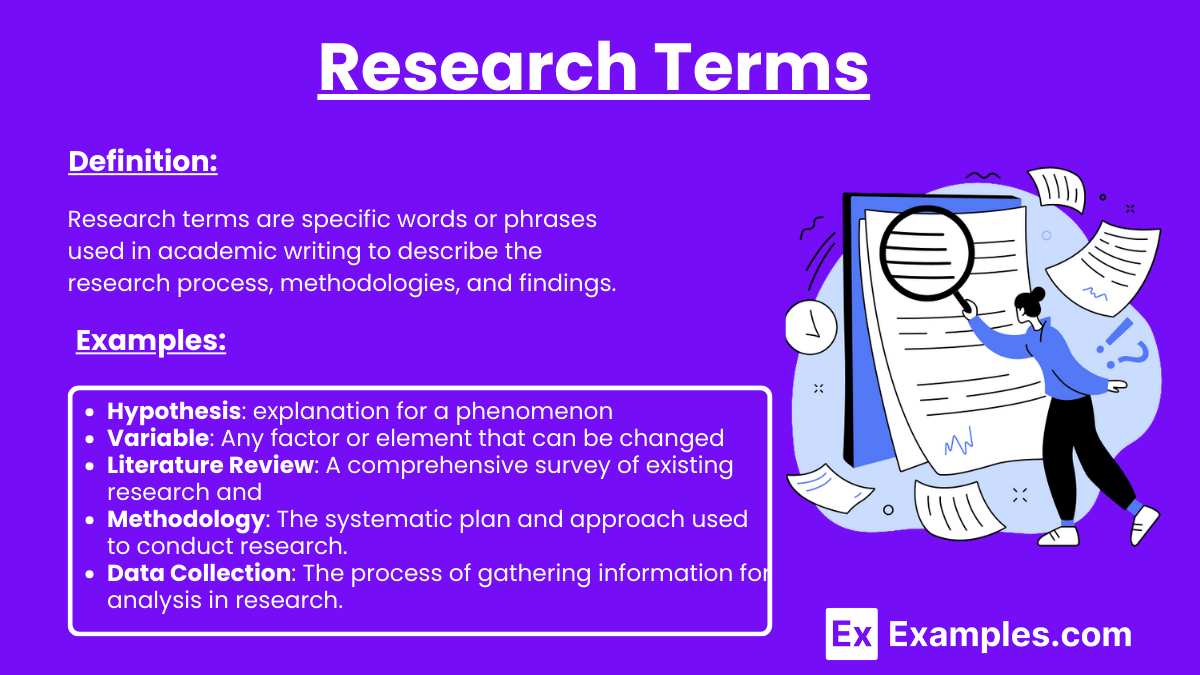Research Terms
Research terms are specific words or phrases used in academic writing to describe the research process, methodologies, and findings. These include concepts like hypothesis, variables, sample size, literature review, and data analysis. Understanding these terms is crucial for interpreting research studies and effectively communicating ideas. Mastery of research terms enhances clarity in academic discourse, whether in a research project proposal, a qualitative research report, or the description of research methodology.
What are terms in research?
Terms in research refer to the specific words, phrases, and concepts used within a study to define its scope, methodology, and focus. These terms ensure clarity and precision, allowing researchers to communicate ideas and findings effectively. Clear definitions facilitate a shared understanding and maintain the integrity and replicability of research.
Examples of Research Terms

- Hypothesis: A proposed explanation for a phenomenon, to be tested through research.
- Variable: Any factor or element that can be changed and measured in research.
- Literature Review: A comprehensive survey of existing research and publications on a specific topic.
- Methodology: The systematic plan and approach used to conduct research.
- Data Collection: The process of gathering information for analysis in research.
- Sample: A subset of a population selected for observation and analysis.
- Control Group: A group in an experiment that does not receive the treatment, used for comparison.
- Validity: The extent to which a research study measures what it intends to measure.
- Reliability: The consistency of a research study or measuring test.
- Abstract: A brief summary of a research study’s aims, methods, results, and conclusions.
- Population: The entire group of individuals or instances about whom the research is concerned.
- Ethics: Moral principles that govern a researcher’s conduct and the conduct of the research.
- Bias: A systematic error introduced into sampling or testing by selecting or encouraging one outcome over others.
- Pilot Study: A small-scale preliminary study conducted to evaluate feasibility, time, cost, risk, and adverse events.
- Peer Review: A process by which a research study is evaluated by experts in the same field before publication.
- Quantitative Research: Research that relies on numerical data and statistical methods.
- Qualitative Research: Research that relies on non-numerical data, such as interviews, observations, and textual analysis.
- Case Study: An in-depth study of a particular case, individual, group, or event.
- Longitudinal Study: Research that follows subjects over a long period to observe changes and developments.
- Cross-sectional Study: Research that analyzes data from a population at a specific point in time.
- Independent Variable: The variable that is manipulated to observe its effect on the dependent variable.
- Dependent Variable: The variable being tested and measured in an experiment.
- Confounding Variable: An outside influence that affects the dependent and independent variables, causing a spurious association.
- Operational Definition: A clear, precise, and measurable definition of a variable for the purposes of a study.
- Statistical Significance: The likelihood that a result or relationship is caused by something other than mere chance.
- Random Sample: A sample that fairly represents a population because each member has an equal chance of inclusion.
- Correlation: A measure of the relationship between two variables.
- Experimental Group: The group in an experiment that receives the treatment.
- Theoretical Framework: A structure that guides research by providing a clear perspective and basis for the study.
- Meta-analysis: A statistical technique that combines the results of multiple studies to determine overall trends.
Research Terms List
| Term | Term |
|---|---|
| Sampling Bias | Control Variable |
| Research Design | Data Analysis |
| Primary Data | Secondary Data |
| Theoretical Sampling | Purposive Sampling |
| Snowball Sampling | Cluster Sampling |
| Stratified Sampling | Survey |
| Questionnaire | Interview |
| Focus Group | Field Study |
| Experimental Design | Randomized Controlled Trial (RCT) |
| Ethnography | Grounded Theory |
| Content Analysis | Descriptive Research |
| Explanatory Research | Exploratory Research |
| Mixed Methods | Triangulation |
| Hypothesis Testing | Null Hypothesis |
| Alternative Hypothesis | Research Proposal |
5 Common Research Terminologies
- Hypothesis: A testable prediction about the relationship between two or more variables.
- Variable: An element, feature, or factor that can be changed and measured in research.
- Sample: A subset of a population selected for observation and analysis.
- Data Collection: The process of gathering information for analysis in research.
- Literature Review: A comprehensive survey of existing research and publications on a specific topic.
Confusing Terms in Research
- Validity vs. Reliability
- Validity: The extent to which a research study measures what it intends to measure.
- Reliability: The consistency of a research study or measuring test over time.
- Independent Variable vs. Dependent Variable
- Independent Variable: The variable that is manipulated to observe its effect.
- Dependent Variable: The variable being tested and measured, which is affected by the independent variable.
- Sample vs. Population
- Sample: A subset of a population selected for observation and analysis.
- Population: The entire group of individuals or instances about whom the research is concerned.
- Quantitative Research vs. Qualitative Research
- Quantitative Research: Research that relies on numerical data and statistical methods.
- Qualitative Research: Research that relies on non-numerical data, such as interviews, observations, and textual analysis.
- Random Sample vs. Random Assignment
- Random Sample: A sample that fairly represents a population because each member has an equal chance of inclusion.
- Random Assignment: Assigning participants to experimental and control groups by chance to minimize pre-existing differences.
- Descriptive Research vs. Explanatory Research
- Descriptive Research: Research that aims to describe characteristics of a population or phenomenon.
- Explanatory Research: Research that seeks to explain the reasons behind a phenomenon or relationship.
Key Research Terms
1. Abstract
- A brief summary of the research paper, outlining the main points, purpose, methods, results, and conclusions.
2. Hypothesis
- A testable statement or prediction about the relationship between two or more variables.
3. Variable
- An element, feature, or factor that can be changed and measured in research. Includes independent, dependent, and control variables.
4. Literature Review
- A comprehensive survey of existing research and publications relevant to the research topic.
5. Methodology
- The systematic plan for conducting research, including the methods, techniques, and procedures used to collect and analyze data.
6. Qualitative Research
- Research that focuses on understanding phenomena through non-numerical data such as interviews, observations, and texts.
7. Quantitative Research
- Research that focuses on quantifying data and analyzing it statistically to draw conclusions.
8. Sampling
- The process of selecting a subset of individuals from a population to represent the whole group in research.
9. Data Collection
- The process of gathering information from various sources to answer research questions.
10. Data Analysis
- The process of examining, cleaning, transforming, and modeling data to discover useful information, draw conclusions, and support decision-making.
Terms Synonymous to Research
| Terms | Synonymous to Research |
|---|---|
| Investigation | Study |
| Inquiry | Examination |
| Analysis | Exploration |
| Survey | Experiment |
| Probe | Scrutiny |
| Inspection | Review |
| Evaluation | Assessment |
| Observation | Fieldwork |
| Appraisal | Exploration |
| Audit | Dissection |
FAQ’s
What is a variable in research?
A variable is any characteristic, number, or quantity that can be measured or quantified in research.
What is the difference between qualitative and quantitative research?
Qualitative research explores concepts and experiences in-depth, while quantitative research involves measuring and analyzing numerical data.
What is a literature review?
A literature review summarizes existing research on a topic, identifying trends, gaps, and key findings.
What is a sample in research?
A sample is a subset of a population selected for study to represent the entire group.
What is a hypothesis?
A hypothesis is a testable prediction or educated guess about the relationship between two or more variables in a study.
What is data collection?
Data collection involves gathering information from various sources to address a research question or hypothesis.
What is an independent variable?
An independent variable is the variable that is manipulated or changed in an experiment to observe its effect.
What is a dependent variable?
A dependent variable is the variable being tested and measured in an experiment, affected by the independent variable.
What is a control group?
A control group is a group in an experiment that does not receive the treatment, used for comparison against the experimental group.
What is a research methodology?
Research methodology is the systematic plan for conducting research, including methods for data collection and analysis.



